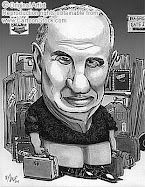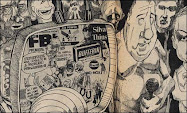 Grappling with fascism's genetic obsessions
Grappling with fascism's genetic obsessionsA new National Gallery show explores the scientific seedbed in which many Nazi notions took root.
SARAH MILROY
Globe & Mail
June 14, 2008
OTTAWA -- The term "blockbuster" tends to give off a bad smell in critical circles, conjuring up visions of Monet water-lily umbrellas, coffee mugs à la Degas and crowds, crowds, crowds. In Canada, two men have been largely responsible for lifting us above this commercialized morass: Jean Clair, the Paris-based writer, curator and former director of the Musée National Picasso, and his Canadian colleague Pierre Théberge, now in his final year at the helm at Ottawa's National Gallery of Canada.
Their association goes back to 1967, when Jean Clair was in his salad days, serving briefly as a curator at the NGC. (His legal name is Gérard Régnier; he had created his nom de plume in 1961 for the publication of his first novel, as a genuflection to French filmmaker René Clair.) Théberge was also working at the gallery as a fledgling curator at the time, and the two shared a creative flair for showmanship unusual in the museum world.
As their careers ascended, so did the scale of their ambitions. When Théberge moved to the directorship of the Montreal Museum of Fine Arts in 1986, Jean Clair helped to orchestrate a number of its most memorable and meaty shows, among them The Twenties: Age of the Metropolis, and Lost Paradise: Symbolist Europe. After Théberge's move to the NGC in 1998, the collaboration continued, with Jean Clair producing the 2004 exhibition The Great Parade: Portrait of the Artist as Clown.
The current exhibition at the National Gallery of Canada, The 1930s: The Making of "The New Man," continues in this tradition. It grapples fearlessly with a gargantuan theme - the rise of fascism in Europe - with an eclectic reach and an amiable air of non-conformity. Like Jean Clair's earlier shows, it feels pulled from the oven before it's been fully baked - some of the themes are not clearly developed enough - but it leaves you with lots to think about and a sheaf of new images floating in your head. As an experiment in popular education, it must be counted a success. ...
Story continues
http://aconstantineblacklist.blogspot.com/2008/06/national-gallery-of-canada-exhibit.html




